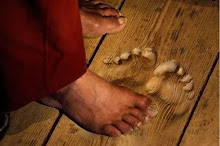Last night, I must have encountered five panhandlers on Elmwood, and I did not give to any of them. I did not give, even though I have committed to practice the way of Jesus, and I know that Jesus commanded:
"Give to everyone who begs from you; and if anyone takes away your goods, do not ask for them again" (Luke 6:30).
So, by my own standard, I have failed. Of course, I am not the only failure. The fact that people ask other people for money on the street represents a societal failure, even if it does not excuse my own behavior.
We need a framework for making our decisions about how to interact with those whom we see in need
.
While others have tried, I am not interested in providing a theological justification for never giving in any manner. On the other hand, I would also maintain that not every person is called to sell all of his/her possessions and give everything to the poor--even though many people are (and you and I should consider that we may be).
Most of us are seeking a "middle way," and while it may not be the ideal, this "middle way" would provide a tremendous improvement for our community.
The problem with middle ways, however, is that they are difficult to make into easy to follow rules. Thus, I will offer no specific prescriptions in this post--only four principles to serve as a framework to consider as you develop your own theology/practice. (If you want a clear and simple rule, see Luke 6:30)
Principal one: The blessings you receive are for the purpose of blessing others. Abraham, whom three faiths claim as their forefather, was told exactly this, in Genesis 12:2. What you have is given to you for a purpose, and that purpose is not your own pleasure.
Principle two: God is judge. You are not.
This principle is also preached in all of the Abrahamic faiths, even if we fail to practice it sometimes. We cannot judge because we are not fit to judge.
Consider the story of C.S. Lewis, a popular Christian writer, who was walking with a friend and they were approached by a panhandler. The man asked for some spare change and Lewis gave him everything he had. Later, Lewis' friend said, "You shouldn't have given that man all that money, he'll only spend it on drink."
Lewis replied, "Well, if I'd kept it, I would have only spent it on drink."
Who are we to decide whether a person is fit to receive grace?
Principle three: The panhandler is a human, and your neighbor.
While there are good arguments for giving and for not giving, in all things one should follow the golden rule and treat the other as you would wish to be treated. Life on the street is already dehumanizing enough, without people pretending you aren't there.
Principle four: "Helping" maintains unbalanced relationships. "Serving" is subversive.
Not once did Christ command his followers to help. His command was to serve. Lives are changed when power structures are upset. If you are a person with power (as most BRO readers are, myself included,) this means setting aside your own privilege--a difficult, but life-changing, thing to do.
These principles are not intended to be definitive, but the start of a conversation. I look forward to your contributions.
(Via)
30 June 2009
27 June 2009
The thing you must remember
the thing you must remember is how, as a child, you worked hours in the art room, the teacher's hand over yours, molding the little clay dog.
You must remember how nothing mattered but the imagined dog's fur, the shape of his ears and his paws. The gray clay felt dangerous, your small hands were pressing what you couldn't say with your limited words. When the dog's back stiffened, then cracked into white shards in the kiln, you learned how the beautiful suffers from too much attention, how clumsy a single vision can grow, and fragile with trying too hard.
The thing you must remember is the art teacher's capable hands: large, rough and grainy, over yours, holding on.
-maggie anderson
You must remember how nothing mattered but the imagined dog's fur, the shape of his ears and his paws. The gray clay felt dangerous, your small hands were pressing what you couldn't say with your limited words. When the dog's back stiffened, then cracked into white shards in the kiln, you learned how the beautiful suffers from too much attention, how clumsy a single vision can grow, and fragile with trying too hard.
The thing you must remember is the art teacher's capable hands: large, rough and grainy, over yours, holding on.
-maggie anderson
YOU
You are the Body of Christ. In you the incarnation must continue. You are to be taken. You are to be blessed, broken and distributed as a vehicle of grace and love...
-St. Augustine
-St. Augustine
Perfection in imperfection
Man's self-experience includes an apprehension of his capacity to transcend himself and unselfishly love another, together with a parallel tendency to be self-centered by pulling into isolation and refusing co-existence.
Our experience of the Body of Christ is also a kind of twofold experience. We experience the gift of unselfish love as well as the self-centeredness and objectively evil actions of others. The Christian must develop a sensitivity to the presence of Christ in both these experiences.
He must discover that God can communicate Himself through the needs and lack of perfection of the Body just as much as He can in the clear manifestations of selfless love. Obvkously, God is never identified with the evil or imperfection, but the human experience of these realities is potentially a faith-encounter with God.
Becoming a Person in the Whole ChristEdwin McMahon, SJ & Peter Campbell, SJ
Our experience of the Body of Christ is also a kind of twofold experience. We experience the gift of unselfish love as well as the self-centeredness and objectively evil actions of others. The Christian must develop a sensitivity to the presence of Christ in both these experiences.
He must discover that God can communicate Himself through the needs and lack of perfection of the Body just as much as He can in the clear manifestations of selfless love. Obvkously, God is never identified with the evil or imperfection, but the human experience of these realities is potentially a faith-encounter with God.
Becoming a Person in the Whole ChristEdwin McMahon, SJ & Peter Campbell, SJ
You call me "teacher"
"A teacher is someone who makes two ideas grow when there was only one before"
"You have not used your education until you have given it away"
Elbert Hubbard
"You have not used your education until you have given it away"
Elbert Hubbard
21 June 2009
20 June 2009
Trust. Trust. Trust.
"The covetous claim to be Christian, yet they have no trust in Christ. For they are always afraid of want in the time to come, no matter how much they have. "
St Thomas More
St Thomas More
16 June 2009
14 June 2009
Well, it's a nice thought...
"This is the difference between us and those who do not know God: they, in adversity, complain and grumble; we , on the other hand, are not drawn away from virtue by the things that go against us but are strengthened in it, for we know even the hairs of our head are numbered."
St Cyprian
St Cyprian
Subscribe to:
Posts (Atom)













